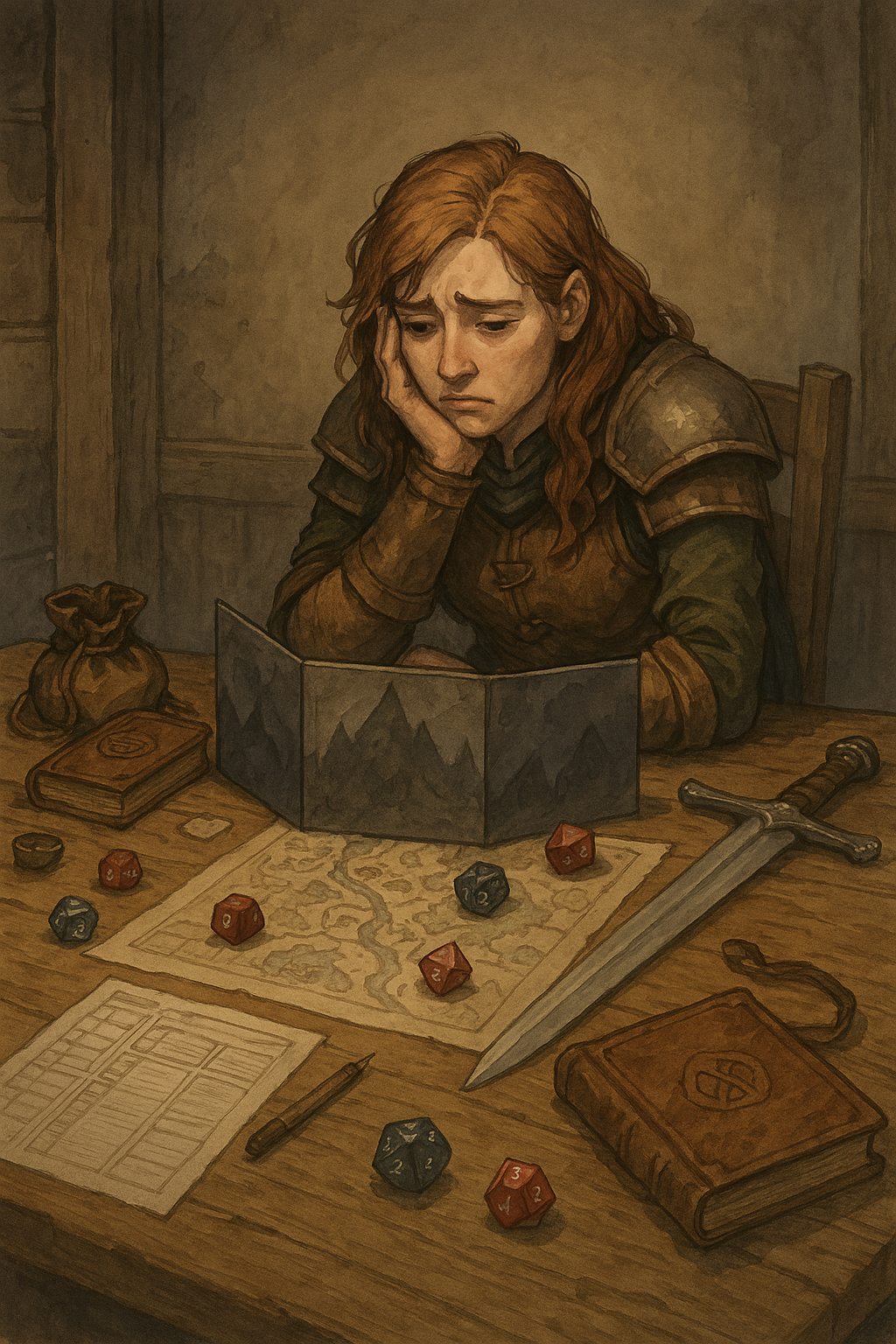Ye Can’t Heal a Heart with Hit Points, The Art of Playing Beside Pain
There’s a kind of silence that ain’t awkward. It’s sacred.
The kind where words would only bruise what’s already breakin’.
If ye’ve ever sat across from a player who’s carryin’ somethin’ heavy; a loss, a heartbreak, a grief that don’t fit into dice rolls. Ye’ll know what I mean.
By Durven’s Last Tankard, don’t try to fix it.
Don’t spill empty comfort or twist yer face into pity.
Just be there.
That’s the art of playin’ beside pain, stayin’ steady enough that the wounded don’t have to wear armor just to sit at the table.
Mike’s Tale: The Session That Went Quiet
Once had a lad named Fen. Loudest rogue I ever knew, all jokes and daggers, could charm a banshee outta her wail.
Then one night, he showed up quiet. Didn’t even draw his dice.
I asked what was wrong. He said, “She left.”
That’s all. Just those two words.
The rest of the table looked to me like I was supposed to mend him with a quest.
But all I did was nod, pour him a pint, and keep the map open.
Didn’t change a thing, not the adventure, not the stakes.
But that night, the tavern stayed warm because no one filled the air with noise.
Sometimes silence is the kindest spell ye can cast.
If ye’ve ever been the one holdin’ the table together when things fall apart, ye might find a bit o’ kinship in When the Table’s Full — But It Feels Empty. It’s the same lesson in a different voice, how to keep the light on when the laughter dies down.
The Lesson: Be the Pillar, Not the Healer
When a friend opens up. Really opens up, treat their words like fragile glass.
No sudden movements.
No half-jokes to “lighten the mood.”
No advice unless they ask for it.
Yer job ain’t to patch their soul; it’s to stand still while they find their footing.
Let them breathe. Let them sort through their thoughts with yer presence as a steady weight beside them.
That’s dwarven empathy, lad. Not the kind that fixes, but the kind that endures.
📌 And if yer table’s worth its salt, they’ll follow yer lead. They’ll learn that comfort don’t always sound like “are ya okay?”, sometimes it sounds like rolling dice in quiet solidarity.
If ye want more on patience and steadiness, take a swig of The Strongest Character at the Table Is the One Who Listens. And if emotions start twistin’ the party dynamic, That Grudge Yer Clingin’ To? It’s Ruinin’ the Game might help straighten the axe handle before it breaks.
When to Speak and When to Shut Yer Trap
If they talk: Listen like ye’re carvin’ stone. Slow, patient, precise. Every word matters.
If they don’t: Don’t force it. Sometimes a shared story, a small joke, or a hand on the dice tray says more than any speech.
If they cry: Don’t look away. Don’t gawk. Just stay there. Let it pass like a storm.
Compassion ain’t pity, lad. It’s endurance.
Yer a friend first, a player second, and a healer last and only if they ask.
For GMs wonderin’ how to handle such moments mid-session, read When Yer Players Show Up — But Their Minds Don’t. It’ll teach ya how to steer the tone without turnin’ the table into a sermon.
The Mid-Tavern Reminder
If yer table’s where the wounded gather, make it a safe hearth, not a stage.
Kindness and quiet ain’t opposites, they’re kin.
👉 Find more lessons for the heart and the table at Tavern Etiquette, wander through the GM Wisdom archives, or drop by Mike’s Tavern to learn how to keep yer game alive in more ways than one.
The Long Game of Care
Don’t think one night of patience earns ya sainthood.
People don’t heal on schedule, and neither do parties.
Just keep showin’ up. Keep pourin’ the ale, rollin’ the dice, and guardin’ the silence.
If it ever wears on ya, if the weight feels like too much, remind yerself of When You’re the Only One Who Cares If It All Falls Apart.
A table’s strength ain’t in its laughter, it’s in its loyalty.
Yer presence might be the only safe place they’ve got that day and that’s worth more than any quest reward.
By me beard, that’s what fellowship really means.
FAQ
Q: What if the game falls quiet because of someone’s grief?
A: Let it. Some nights ain’t for monsters or maps. They’re for rememberin’ why we play together in the first place.
Q: Should I tell the GM about what’s happenin’?
A: If it affects the game and the player’s alright with it, aye. GMs are there to hold the tone steady, not to pry, but to protect.
Q: How do I know when to lighten the mood again?
A: When they do. When they crack the first smile, laugh the first laugh. Follow their lead, lad. That’s how ya walk beside pain, not in front of it.

